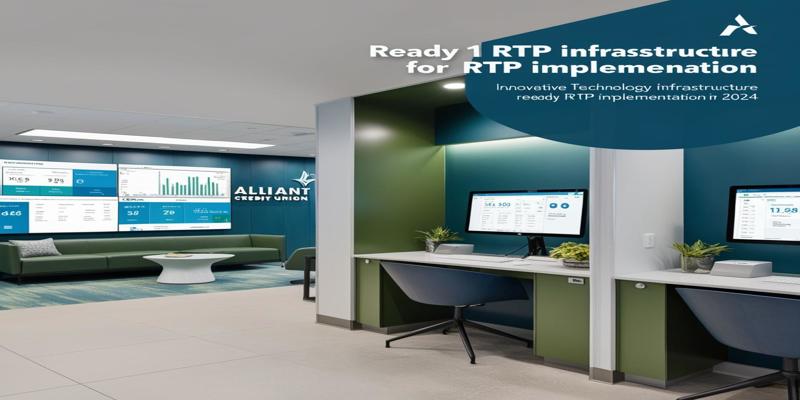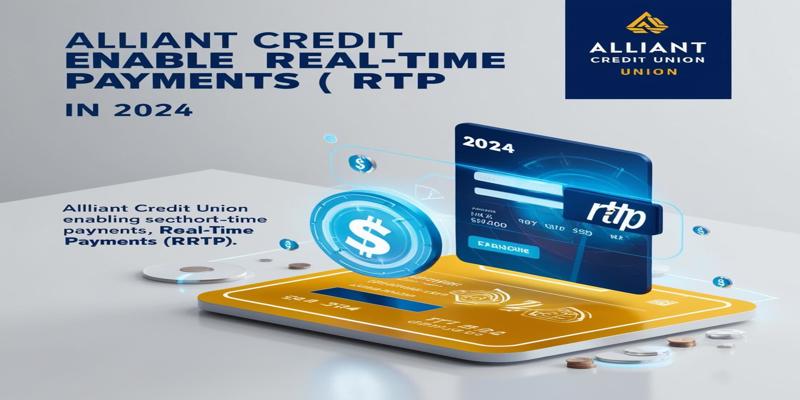In 2024, Alliant Credit Union Will Make RTP Available
Dec 11, 2024 By Darnell Malan
Alliant Credit Union of the US is one of the leading credit unions, and it is all set to upgrade financial services by introducing Real-Time Payments in 2024. This strategic move aims to offer quicker and more efficient payments to the members in line with demands for instant financial transactions. As a fully digital member-centric institution, Alliant is committed to leveraging technology to improve the banking experience of its over 800,000 members.
What is RTP?

RTP is an abbreviation for Real-Time Payments, a scheme for banks and credit unions that supports instantaneous money movements. Unlike older methods of processing, which could take up to days for transactions to reflect in the account holder's account, RTP assures transaction completion within seconds and immediate availability of the funds in the account holder's account. It is ideal for payroll depositing, bill payments, and peer-to-peer transfers.
Benefits of RTP
- Speed: Settlements are in real-time, hence drastically reducing waiting times.
- Convenience: Members can send/receive money in real time without using checks or cash.
- Improved Cash Flow: With immediate payments, businesses can adequately manage their cash flow.
- Any Time: RTP is available 24/7, and a transaction can be made anytime.
- Greater Security: Advanced forms of encryption are used in RTP transactions; this makes it a very secure way of transferring funds.
Alliant Credit Union's Commitment to Innovation
Over the years, Alliant Credit Union has maintained its commitment to innovation and member satisfaction. This introduction of RTP is the full expression of a mission that commits it to offering the best financial value and, at the same time, making it easier for members to save, borrow, and pay. Its focus on technology is clear through its strong mobile app and online banking services, which provide seamless banking.
Current Financial Services
Alliant offers a variety of financial products that cater to different needs:
- High-Yield Savings Accounts: Competitive annual percentage yields (APYs) on savings.
- Checking Accounts: No monthly fees for members who opt for e-statements.
- Loans: Various loan products, including personal loans, auto loans, and mortgages.
- Credit Cards: Rewards credit cards with low interest rates and no annual fees.
How RTP Will Transform Alliant's Services

The implementation of RTP will significantly enhance Alliant's service offerings. Here's how:
Faster Payroll Processing
With RTP, employers can deposit funds directly into an employee's account at any moment. This will help employers increase satisfaction among their workforces and give businesses an easier payroll management system. It will also save employers from the headache of issuing paper checks and cut down on payroll management costs.
Instant Bill Payments
Members can pay bills in real-time, while traditional methods usually take some days and incur a late fee. This guarantee helps service providers receive the bill on time. Utility companies and subscription services, for example, will appreciate this immediate processing capability.
Improved Peer-to-Peer Transactions
RTP will make person-to-person settlement between members much easier and faster. Members can, for instance, easily send money to their friends and family members free from delays. This feature would be beneficial in cases where gifting on birthdays, holidays, or events should be efficient and fast.
Enhanced Business Services
With RTP, small businesses will benefit tremendously by getting paid instantly by customers. This will improve business cash flow management, allowing them to reinvest in operations or settle expenses on time.
Preparing for Implementation
RTP implementation in 2024 will need Alliant Credit Union to focus on the following areas of concern: Infrastructure Development
Infrastructure Development
Robust technology infrastructure investment is needed to support real-time transactions; this includes upgrading the current systems and integrating new technologies in compliance with the standards set by RTP. Alliant may further collaborate with some fintech companies with payment processing solutions to enable the company to transition easily.
Staff Training
It is also essential that the staff receive training on the new system to help members with their various needs competently. The training topics will cover the many benefits of RTP and how to access them hassle-free in transition. Additionally, staff will be trained in troubleshooting common problems arising from initial implementation.
Member Education
Alliant will run education campaigns for its members, teaching them to take maximum advantage of RTP. The campaigns will include webinars, flyers, and other communications through their online platform. In addition, FAQs will be posted on Alliant's website regarding common issues with using RTP.
Challenges Ahead
Though very apparent, the advantages of RTP implementation come along with several challenges that might arise within Alliant Credit Union during the transition:
Regulatory Compliance
Ensuring financial regulation compliance regarding real-time payments will be a significant concern. Alliant should carefully avoid any potential legal issues arising from poor adherence to these regulations. This requires them to strictly obey all guidelines provided by the National Automated Clearing House Association, among other regulatory bodies.
System Integration
The technical challenge is integrating RTP into existing systems without disrupting current services. To reduce risk, this would require a phase-by-phase implementation. Alliant may also consider pilot programs with some member groups before full implementation.
Member Adoption
It will take ongoing education and support to encourage members to use this new means of payment. Alliant needs to make its members comfortable with using RTP in addition to traditional methods of payment. These skeptical users might be incentivized with lower fees for using RTP.
Future Outlook for Alliant Credit Union
With Alliant Credit Union positioning itself for a launch in 2024 that will support RTP, it is once again securing its position as an innovator in today's banking world. In addition to enhancing the member experience, real-time payments set a higher standard for other credit unions and financial institutions that would also work on providing innovative services.
Expanding Digital Services
In addition to RTP, Alliant's extra growth in its suite of digital services is endless. In-app budgeting tools and added security features, such as biometric authentication, could further enhance the user experience and heighten security.
Collaboration with Fintech Companies
Therefore, in this competitive digital banking environment, partnerships with fintech companies may prove critical for Alliant. Partnerships will drive innovative solutions to improve service offerings and reduce operational costs.
Conclusion
This will be a giant leap toward new, breakthrough financial services for Alliant Credit Union as it turns on the functionality of Real-Time Payments in 2024. With this innovative payment solution, Alliant aims to enhance member satisfaction through faster transaction execution and facilitate better cash flow management. In planning the transition, much emphasis is placed on technology and member education regarding the smooth implementation of the new system.








